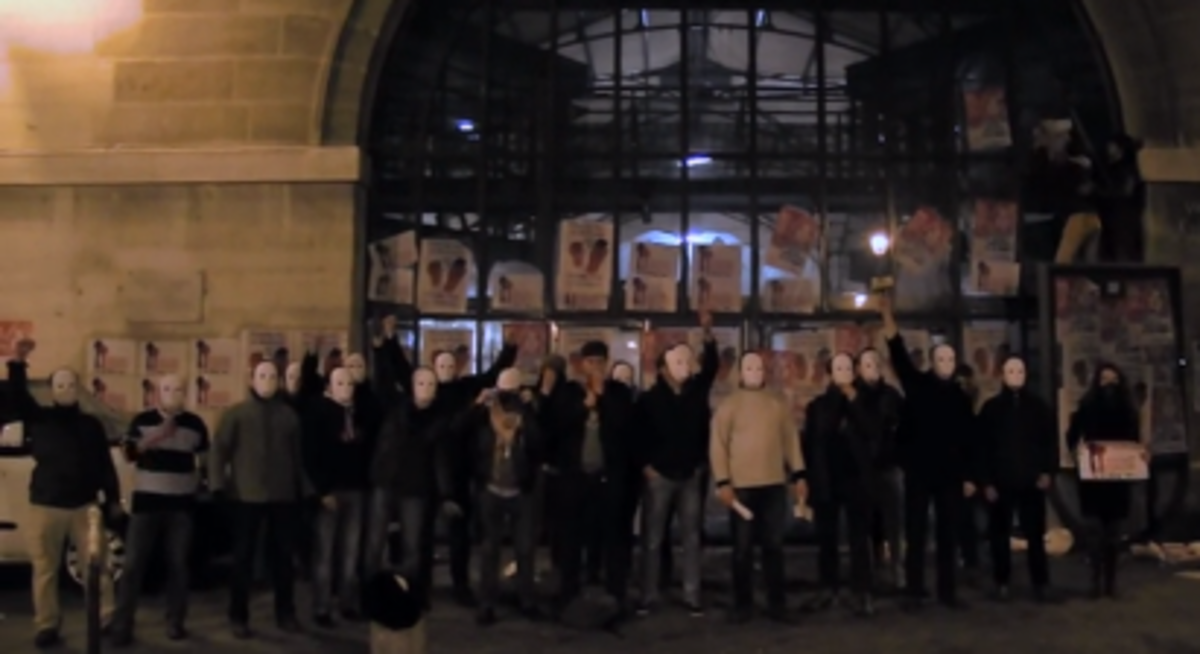Just how far will they go? The small group known as 'Printemps français' or 'French Spring' – a deliberate reference to the 'Arab Spring' revolutions - has claimed responsibility for an attack on premises in Paris used by pro gay and lesbian groups. Masked activists from the group are shown on their own video vandalising the outside of the building in the Marais district of the capital used by the Printemps des assoces LGBT association which promotes lesbian gay, bisexual and transgender rights.

So who are Printemps français? They are the radical fringe of the 'Manif pour Tous' or 'Demonstration for All' series of protests organised by a comedian calling herself Frigide Barjot against the impending new law giving full marriage and adoption rights to same-sex couples. This 'movement within a movement' made its presence known at the Paris protest march on 24th March when it attempted to force its way on to the Champs-Élysées, in defiance of a ban issued by the police prefecture of Paris. It is led by about ten people and suddenly emerged after the 13th January protest march, appearing on extreme right-wing blogs, particularly among the Catholic traditionalist fringe, then on its own website printempsfrancais.fr. Its objective: to force the government to abandon its law on same-sex marriage, which is now passing through the Senate. And perhaps to go even further. For some radicals, the Manif pour Tous movement is apparently heralding the coming insurrection...

One man encapsulates this radicalisation: Philippe Darantière, the figure in the background who runs Printemps français. “In 2013 the Manif pour Tous is ready to undermine the government of François Hollande,” he has predicted. A 52-year-old former paratrooper officer who later moved into the field of economic intelligence, it was Philippe Darantière who instigated the attempts to breach police barriers at the 24th March protest. The clashes with the forces of law and order that took place then do not seem to have been spontaneous.
Mediapart has found evidence of this in an article published by Darantière on the site Nouvelles de France five days before those demonstrations. “It would be amusing to see the Paris police prefect take the risk of abandoning the capital to the chaos of hundreds of thousands of protesters massing in the streets, overwhelming the ability to maintain order and pushing from all directions against the police barriers that are trying to stop access to the Champs-Élysées...” he wrote on 20th March, referring to the restrictions that had been placed on the protest.
During the march the first wave of around 200 protesters who tried to get through the barriers were activists from the ranks of traditional Catholics. The same circles who support Printemps français. Activists from Renouveau Français ('French Renewal') – a small nationalist, Catholic and counter-revolutionary group who fight against the “homosexual lobby” - former members of the old far-right student group Groupe Union Défense (GUD) and members of the Lyon-based group GUD-Lyon then joined the action.
In his article of 20th March Philippe Darantière also called for the movement's “counter-attack” to be based on using influence, gaining recognition and through using “coercion”. Expanding on this last point he noted: “It will be claimed that such a reaction by the Manif pour Tous will be illegal. That is the wrong analysis. The very logic of a power struggle is to dominate the other side by imposing one’s superiority. At this stage it's all about bluff and holding one's nerve.”

Officially Printemps Français is led by Béatrice Bourges, who was ousted as a spokesperson for Manif pour Tous. She is president of the pro-family Collectif pour la famille which represents “79 French associations defending marriage and the family” and which has been involved in the opposition to same-sex marriages since 2007. Béatrice Bourges, who stood as a candidate in Versailles on a right-wing ticket in the 2012 Parliamentary elections, is also close to former government minister Christine Boutin, who collapsed as she approached the police barriers during the 24th March protest, apparently overcome by tear gas.
It is Philippe Darantière, however, who is pulling the strings of the movement and who is pointing out its weaknesses and putting perspective on its actions. “The first weakness is due to a lack of knowledge of the principles of power struggles,” the former paratrooper says in his article. He says one should not overlook the “coercive power” which is “exerted by the ability to mobilise and, if necessary, to block”. He adds: “The second weakness is due to the structure of the movement, or rather its absence of structure.”
'Printemps français's actions harm our movement'

Darantière is a Catholic traditionalist who is described by his publisher as an activist “engaged in the pro-life struggle and for the defence of the family”. In a book he wrote in 2005 (see image right) he calls for “Catholic political action”. According to Darantière's Linkedin page he works as an “expert in social and union relations” after “thirty years of experience in preventing risks and crises” as a “director of education at IST Social Enterprises” a “company providing advice, research and teaching in social and societal relations”.
The IST or Institut supérieur du travail is in reality a structure linked to bosses in the metallurgy industry and which is well-known for looking after the redeployment of many extreme right activists. But, above all, Darantière was a company commander in the French Army and an instructor in overseas operations in Africa and the Indian Ocean. That led to strong friendships in mercenary circles and among the team of the notorious Bon Denard, who carried out two coups in the Comoro Islands. Later he joined the team of Philippe Legorjus, the former head of the French Gendarmerie's special operations unit the National Gendarmerie Intervention Group (GIGN) who moved to the private sector after a hostage tragedy involving the GIGN at Ouvéa in the French overseas territory of New Caledonia in 1988. Darantière was 'director of projects' at PHL consultants from 1991 to 1994 then 'associate director' of Atlantic Intelligence from 1995 to 2001.
Printemps français today contains two different strands of thinking. On one side are the hard-liners who want to topple the government and who believe that the far-right Front national (FN) let them down by abandoning the fight against same-sex marriage. On the other is a group that wants to go down the same route as Christine Boutin for the local elections in 2014 and try to obtain as many councillors as possible with the Christian Democrat Party (PCD). While the FN is not part of this strand, the former FM member and current extreme right MP Jacques Bompard is involved in it.
According to Darantière, the main asset of Manif pour Tous is “the provinces”. Referring to the “70 demonstrations” organised by the collective organisation across France between 17th November 2012 and 8th March 2013, the “half a million protesters” who went to Paris on 13th January and the “200 gatherings” across France on 2nd February, the former paratrooper explains in his article that the “provinces” were the “reservoir for the demonstrators of 24th March”. He notes: “Their determination can make the difference.”
Since those protests on 24th March the anti gay marriage gatherings have increased in number in the provinces, with activists targeting ministerial visits. But in recent days a series of incidents has indicated a worrying radicalisation of opponents of same-sex marriage, beyond even that of the Printemps français movement.
Last Friday evening the MP overseeing the text of the new law, Erwann Binet, was aggressively heckled by around 15 activists from a radical right group 'Jeunesses nationalistes' run by Alexandre Gabriac, who was expelled from the FN in 2011 for giving a Nazi salute. Binet, who has been attending more meetings in the regions in recent weeks, has now decided to cancel forthcoming ones. “The boundary between the right and the extreme right is becoming less clear,” notes the MP. “For several weeks there have been people in front of me with Manif pour Tous on their tee-shirts but who have more radical views.”
Meanwhile last Friday night a car belonging to senator Esther Benbassa, a member of the green alliance Europe Écologie - Les Verts (EELV) who is leading the debate in the Senate on the same-sex marriage law, was “smashed up” by unknown attackers. “I don't know who it was but obviously I am making the link with the radicalisation of the 'anti' [group], I am worried,” she said. The senator, who has made a formal complaint to the police, has become a target of certain websites and internet users of the extreme right and says she has received a number of “insulting” emails in “bad taste”.
Then in the early hours of Sunday morning came the attack on the LGBT premises in Paris mentioned earlier. The walls were covered in Manif pour Tous posters and the attack was claimed by Printemps français, as this video clip shows:
In another incident, two young homosexual men Wilfred and Olivier were attacked in Paris's 19th arrondissement, apparently just for walking arm-in-arm. The attack has provoked considerable reaction on social media networks, especially after Wilfred put a photo of his badly-beaten face on his Facebook page.
A gathering against homophobia was due to be held at 8pm on Wednesday 10th April in Paris. “I am alarmed at the way in which homophobic rhetoric has been unleashed in just the last few weeks,” says EELV MP Sergio Coronado. He is preparing to write to interior minister Manuel Valls asking that he take action against the “instigators of these violent incidents, small extreme right-wing groups known to the police”.
For her part, Frigide Barjot has announced her intention of making a formal complaint. “Violence has no place [in our movement]. We condemn Printemps français's acts. They harm our movement,” she said. “They have copied and parodied us, they prejudice our philosophy of the 'Demonstration for All'.” However, Erwann Binet believes that Frigide Barjot had in fact herself “wanted to radicalise the movement”.
Contacted by Mediapart, Philippe Darantière let it be known via a colleague at the IST that he would not respond to requests for an interview.
------------------------------
English version by Michael Streeter


